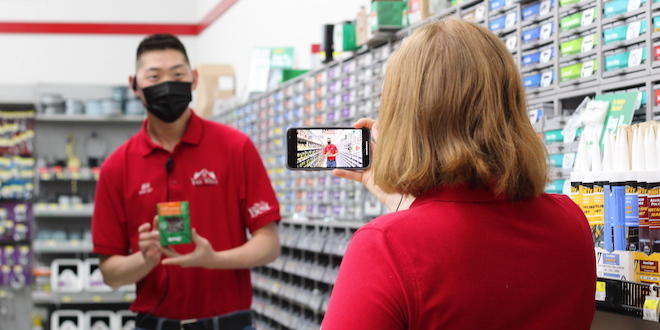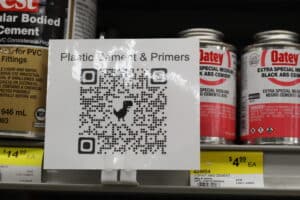
How NHPA’s Retail Management Certification Program Addressed One Retailer’s Labor Challenges
The Problem
Like many retailers, Cascade Home Center in Dallas, Oregon, has been affected by the labor shortage, with not enough employees to provide a high level of customer service.
The Solution
Geoff Saunders enrolled in the North American Hardware and Paint Association’s Retail Management Certification Program. Students take on a business improvement project as part of the program, and Saunders used his project to explore adding QR codes to the operation as a way to engage with customers without needing extra staff.
The Result
Starting in the Dallas, Oregon, location, Saunders saw his Retail Certification Management Program business project through and added QR code videos to all of the operation’s seven locations. The videos have given employees an additional touchpoint with customers without causing additional stress on the employees and have provided one solution to labor shortage woes.
Resources
- Guide to Creating QR Code Videos
Walk step-by-step through the process of creating your own QR code videos by downloading our step-by-step guide. - What’s New in Smart Displays
Discover five smart display trends that will influence the evolving in-store retail experience. - Learn More About the Retail Management Certification Program
See how the program teaches owners and managers in the home improvement industry the skills to grow store sales and profits in today’s changing retail landscape.
“I presented three different ideas to my regional manager and our company owner, and the QR codes were the concept they liked the best. RMCP helped me hone that idea and make it feasible for our company.”
- Geoff Saunders
Cascade Home Center
Executive Summary
The labor shortages seen in the wake of the COVID-19 pandemic have left many retailers scrambling to find ways to still offer a high level of customer service with fewer staff. For Geoff Saunders, manager of Cascade Home Center in Dallas, Oregon, QR codes have been the answer to recent labor issues.
Saunders implemented QR codes into his store as a way to provide customers with additional information without needing to talk to an employee. The QR codes link to a video, created and featuring Cascade Home Center employees, that explains how a product works or shares important information about a specific item. Since implementing the program in his store, Saunders has helped other company store managers add the QR codes to their locations and has been able to maintain quality customer service in light of staff shortages.
The Problem
For home improvement stores, the first of the year typically means fortifying your workforce in preparation for the busy spring and summer months. Cascade Home Center, which is part of the Gold Beach Lumber operation, also ramps up its staff in the first quarter, but in 2020, the management team decided against any additional hiring because they thought the economy would take a downturn.
Saunders says the team also decided against hiring because it can be a long process as the company works diligently to get the right people in the right jobs. The operation has a technical hiring program—candidates take a predictive index assessment and cognitive evaluation, among other requirements, so hiring can be a cumbersome process even in a balanced job market.
“We were getting overrun with business and just didn’t have the time to hire,” Saunders says. “And with the unemployment benefits available after the lockdown, people weren’t exactly lining up for jobs.”
While the company had trouble hiring, it did not have trouble getting customers in the door. Dallas is a bedroom community for Salem, Oregon. Before COVID-19 hit, Dallas residents would do their shopping at the big-box stores in Salem, Saunders says.
“During the pandemic, we had a ton of new people coming in, many who didn’t even know we existed,” he says. “They had surplus income and were wanting to take on projects to update their homes, making them better places to live since they had to hunker down and stay home. Consumers were spending more money, and we got hit with lots of extra business.”
On one particularly busy Saturday, Saunders says he and six other employees helped 700 customers during the store’s opening hours.
“We had never been that slammed before. I have excellent employees, and they were doing the best they could, but we still struggled to help everyone,” he says. “As I was watching a line of customers waiting for help, I thought to myself, ‘I wish I could clone my employees.’”
That’s when the idea for using QR codes in the store was born.
“I thought it would be great if we could refer customers to a QR code they could scan with their phone to get a brief tutorial on whatever project they’re working on,” Saunders says. “The QR code could keep them in the store until an employee could get to them, or best-case scenario, it provides all the information they need.”
The Solution
In 2021, Saunders participated in the Retail Management Certification Program (RMCP) from the North American Hardware and Paint Association (NHPA). RMCP is a college-level program featuring industry-specific business courses and a business improvement project tailored to each participant’s operation. For his project, Saunders decided to pursue using QR code technology to more effectively reach customers and provide better customer service. He credits RMCP for the opportunity and resources to make his vision a possibility.
“I presented three different ideas to my regional manager and our company owner, and the QR codes were the concept they liked the best,” Saunders says. “RMCP helped me hone that idea and make it feasible for our company.”
As Saunders explored the best way to make his idea a reality, he started looking on YouTube for videos about different home improvement projects. He didn’t find any he loved, so he went to his associates to film the videos, which also gives the videos a personal touch.
The staff has experience putting together videos and had previously created Facebook commercials. He also has several younger employers who create videos for the social media platform TikTok.
“I just tell them what subjects I want to tackle, and they go for it,” Saunders says. “When I saw how easy it was, it was kind of a no-brainer. I have two associates make one video, and when you do the math, a 2-minute video costs 68 cents in wages, plus some time editing. We have fun with them.”
Once the videos are filmed and edited, Saunders uploads the videos to the store’s YouTube channel and generates a QR code with a free online code generator. He prints out the QR code with the video’s URL embedded in it and attaches it to a shelf hanging tag. The company is also working with its wholesaler on a shelf talker that is durable and suited to this type of signage.
Saunders has placed the QR codes in locations throughout the store where projects require more detailed information, including departments like plumbing, electrical and irrigation. The QR codes act as a “not-so-silent” salesperson, potentially increasing the average ticket and improving gross margins.
Starting with a list of 40 topics, Saunders has charged certain associates to work on specific projects they have particular knowledge in.
He’ll create a catalog of videos each Gold Beach store can use, and each store can also come up with their own topics and record their own videos. The QR codes have been implemented in each of Gold Beach’s seven locations.
Saunders started a YouTube channel for the company to host the videos and track analytics. He also tracks analytics through the QR code generation platform. Austin Wheeler, digital marketing specialist, says the video about how to repair a leak has performed the best so far, but each of the videos has gotten high engagement.
“Our customers have expressed gratitude regarding the free advice and guides we’re providing,” Wheeler says.
Saunders is continually looking for new ways to add more production value. He has also signed up for a Vimeo account to be able to edit the videos and wants to purchase wireless microphones to help cut out background noise.
“I would love to add layers to this eventually, such as including information on where products mentioned in the video are located in the store,” Saunders says. “I think this project is just the beginning of how this technology can help our company.”




